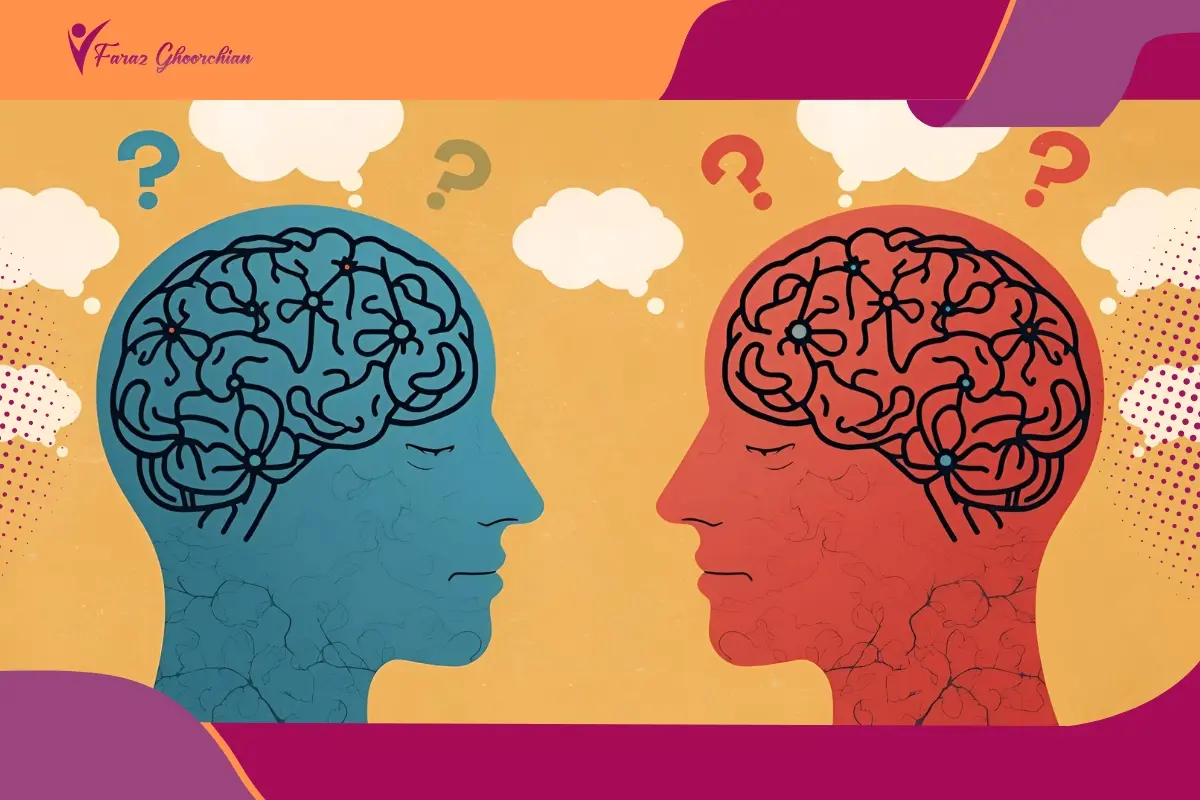Learn what cognitive dissonance is, why it happens, classic signs, examples, and practical ways to reduce it in work, marketing, and relationships.
Introduction
Most readers know the quiet strain between values and behavior. That strain is exactly what is cognitive dissonance aims to explain. It is the uncomfortable mental pull when beliefs, choices, or incoming facts do not match. Grabbing a pastry after promising to cut sugar, defending a purchase that felt impulsive, or ignoring a report that contradicts a favorite viewpoint are common patterns. Learning what does cognitive dissonance mean gives the reader a working map: the mind will try to reduce tension by shifting actions, updating beliefs, or revaluing the issue. This guide previews the whole path ahead, from quick ways to notice the first flicker of discomfort to practical steps that bring habits, decisions, and identity into cleaner alignment.
Definition & origins
In clear terms, psychologists use what is cognitive dissonance in psychology to describe the mental discomfort that appears when beliefs, choices, or new facts do not align. Put simply, what is cognitive dissonance names the gap the mind tries to close so that self image, values, and behavior feel consistent.
Leon Festinger introduced what is cognitive dissonance theory in 1957 after observing how people justify conflicting commitments. The core idea held up in lab and field studies and guides modern practice. Researchers ask what is cognitive dissonance in psychology today to test how identity, public commitments, and sunk costs intensify that tension and push people toward change or rationalization.
To keep terms straight, what is dissonance in psychology refers to the uncomfortable state itself, while what is the definition of cognitive dissonance specifies a mismatch among cognitions such as beliefs, memories, and actions. In daily life the pattern is simple. A person notices a conflict, feels strain, and then reduces it by changing behavior, updating beliefs, or adding new reasons that make the choice seem right. Understanding this cycle turns a vague feeling into a practical steering tool.
How it feels & why it happens
Early clues often sit in the body. A tight jaw, restless scrolling, or a quick burst of defensiveness sketch what does cognitive dissonance feel like in daily life. People notice they start explaining choices to themselves, postpone decisions, or cherry-pick data, small behaviors that snowball into the broader effects of cognitive dissonance on focus and mood.
Under the surface, identity and commitment do most of the pulling. Public promises, sunk costs, and group norms frequently drive what causes cognitive dissonance. The mind resists being two stories at once, so it pushes to shrink gaps between values and behavior. In practice, this explains why someone doubles down after a shaky purchase or avoids feedback that highlights what is dissonance in psychology during high-stakes moments.
A simple primer helps. Bias toward confirming prior beliefs magnifies the tension, which is why a short note on what is negativity bias belongs in every playbook. Naming the pattern reduces shame, turns discomfort into a cue for inquiry, and sets the stage for cleaner choices.
Types & mechanisms
Researchers group the pattern into practical buckets so readers can act on it. The types of cognitive dissonance most often discussed answer What are the four types of cognitive dissonance in everyday terms:
- Belief–belief conflict: Two held ideas collide, such as valuing health while believing “treats show love.”
- Belief–behavior conflict: Actions contradict stated values, like skipping a promised workout.
- Conflict from new information: Fresh evidence challenges a long-standing view, prompting scrutiny or rationalization.
- Forced compliance or insufficient justification: A person publicly supports something they privately doubt, creating strain.
Mechanisms that keep the cycle running are predictable. Post-decision rationalization softens regret after difficult choices. Effort justification raises the perceived value of goals that required heavy sacrifice. Selective exposure filters inputs to protect identity, while trivialization lowers the importance of the clashing belief. Adding consonant reasons can also restore balance. In practice, knowing which bucket fits and which mechanism is firing turns abstraction into a checklist for change, and it links directly back to what is cognitive dissonance theory that guides evidence-based steps to reduce the tension.
Spotting it
How do you tell if you have cognitive dissonance shows up in small, repeating cues. People catch themselves explaining choices they did not plan, avoiding a clear metric, or scrolling to find only agreeable facts. A quick screen of What are 7 signs of cognitive dissonance includes defensive justifications, delay on obvious next steps, irritability when challenged, selective information seeking, regret after decisions, shifting goalposts, and minimizing the importance of a value.
For a practical check, use a sixty second audit after a choice. Ask, “What did I intend, what did I do, what would count as disconfirming evidence?” If the answers wobble, that is often how do you tell if you have cognitive dissonance in action. In social situations, pair this audit with tools that teach calm exposure and perspective taking, such as how to solve social anxiety.
Teams and couples can normalize early detection with short debriefs. If What are 7 signs of cognitive dissonance are frequent, schedule a structured review and write one measurable change for the next attempt. Listening skills matter here, so add a short primer on definition for active listening to keep feedback specific and nonreactive.
Marketing & communication
Used well, What is cognitive dissonance in marketing means helping customers see a gentle gap between what they value and what they currently do, then offering a clear path that respects choice. Instead of scare tactics, teams map the customer’s stated goals to small next steps. Clear copy, honest comparisons, and frictionless trials let readers decide. In this frame, what is cognitive dissonance becomes a lens for designing messages that reduce regret and build trust rather than pressure.
Inside organizations, cognitive dissonance theory in communication guides how leaders announce change. Town halls that surface concerns, show disconfirming data, and invite questions lower backlash because people feel seen. Citing current research clarifies what is cognitive dissonance in psychology today and explains why pre-commitments, written rationales, and follow-up metrics help teams update beliefs without losing face.
Practical guardrails keep efforts ethical. State benefits and limits side by side. Replace hype with specific outcomes and time frames. Offer checklists that connect features to values, and use plain metrics in nurture emails. When feedback shows confusion, adjust the promise before scaling the campaign. The result is marketing and internal messaging that align identity, expectations, and action so choices feel consistent after the click.
Relationships & boundaries
Tension at home or work often shows up first in tiny mismatches between words and actions. Cognitive dissonance in relationships is the name for that gap, and a cognitive dissonance relationship improves when both sides make expectations specific and testable.
- Name the mismatch gently: “Here is what I said I’d do, here is what happened, here is what I’ll change.”
- Set one boundary per issue: time, budget, or response window. Write it, repeat it, and agree on a check-in date.
- Use short repair scripts: “I was defensive; the data fits your point. Let’s try your method for a week.”
- Pre-commit to a neutral metric before a decision, then review the result together to reduce blame.
- Share the load: assign one owner per task and a fallback if the owner gets stuck.
- Watch for cognitive dissonance in toxic relationships: repeated promises without change, isolation from feedback, or pressure to drop values. If these patterns persist, consult a third party and read about a toxic relationship exit plan.
- Close the loop: celebrate kept agreements, revise the ones that failed, and keep the next step small enough to complete this week.
Conclusion
Seen clearly, what is cognitive dissonance is not a personal flaw but a dashboard light that helps decisions improve. The friction signals a gap between values and actions, and that gap can be closed with small, testable moves. One weekly ritual works well: write the intention for a situation, note the actual behavior, and record one piece of disconfirming evidence to look for next time. Share the plan with a partner or teammate, then review the outcome in a short debrief. Over time the cycle becomes familiar. Identity feels less threatened, habits line up with priorities, and choices require less energy. The result is steadier progress that holds up under pressure.











































